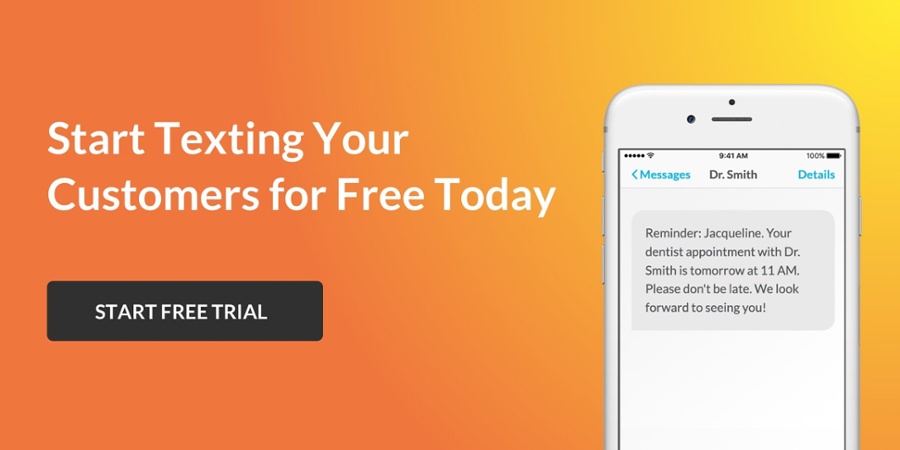In an age where information moves quickly, staying informed and up-to-date is not just a desire but often a necessity. While various forms of digital communication jostle for attention, one of the oldest yet persistently relevant methods is the humble SMS notification.
Short Messaging Service (SMS) notifications are the public’s preferred Business-to-Consumer (B2C) communication method. Recent reports have revealed that:
- 83% of consumers like to receive appointment reminders via SMS
- 60% prefer handling customer service interactions over SMS
- 75% want to receive updates on the shipping status of their deliveries via SMS
If you’re ready to provide your customers with important alerts and updates, then take five to put your phone in Do Not Disturb mode. We’re unpacking the meaning of SMS notifications and their various use cases and providing clear examples of how to use them for your business.
Table of Contents
- What is an SMS Notification?
- Importance of SMS Notifications
- When to Use SMS Notifications
- Best Practices
What is an SMS Notification?
SMS notifications are short text messages sent to a mobile device. They inform individuals about important events, transactions, or updates that require their attention. Unlike marketing messages, which aim to promote products or services, SMS notifications smooth communication between entities and individuals.
Understanding SMS notifications, meaning the simple alerts delivered to your mobile phone, can significantly enhance how businesses and organizations connect with individuals.
One important distinction is how SMS notifications differ from push notifications. SMS notifications are sent through traditional cellular networks and are delivered directly to a phone's native messaging app. Unlike push notifications, which are generated by a specific app and need an internet connection to be received, SMS notifications can reach any mobile phone, smartphone or not, as long as it has a cellular signal.
Push notifications pop up on your phone's home screen and stay there until you dismiss them. On the other hand, SMS notifications appear as text messages and stay in your inbox until you decide to remove them.
Importance of SMS Notifications
As of 2024, nearly 7 billion registered smartphones are capable of receiving SMS messages. On top of this, text messages have a 98% open rate and are delivered within seconds—even to recipients half a world away.
This ubiquity, immediacy and familiarity make SMS notifications so valuable for modern businesses. In the digital age, people have come to expect lightning-quick updates and responses when dealing with businesses. In fact, 90% of consumers see immediate responses as either ‘Important’ or ‘Very Important’ in customer service scenarios.
Thus, to give your customers the instant, accessible and familiar experience they desire, turn to SMS notifications to deliver important information—rather than other formats like email or push notifications.
When to Use SMS Notifications
SMS notifications are best used when your customers need instantaneous updates with relevant information from your business. Some appropriate times to use SMS notifications include:
Emergencies
Governments and organizations use emergency text alerts to provide critical information during natural disasters, health crises, or security threats.
General Updates
Whether it’s a delayed shipping notification or an appointment confirmation text, SMS is an effective tool for providing timely updates.
Routine Rescheduling
For businesses that need to optimize their daily schedules or make adjustments for clients, SMS shines as a reliable method to reach out to customers for rescheduling appointments or services.
Event and Appointment Reminders
Healthcare providers, service companies, and others send appointment confirmations and reminders to ensure individuals keep track of their scheduled commitments. One recent study showed reminder texts reduced missed medical appointments by up to 41%.
Transactional Updates
For banks and financial institutions, daily protocol often involves SMS notifications, meaning they often use SMS to inform customers of account activities, transactions, and security confirmations.
Travel Updates
Airlines and transport services send boarding passes, flight changes, and travel advisories through SMS to keep travelers informed on the go.
Educational Alerts
Schools and universities transmit important notifications to students and parents regarding campus events, closures, or emergency situations.
Faith Organization Communications
Churches and religious organizations use SMS notifications to communicate with their congregation about service times, event changes, prayer requests, or community updates. This keeps members connected with their faith community and aware of important spiritual activities or organizational news.
Here are some examples demonstrating SMS notifications in action:
- A bank sends a message: "Dear [Name], $500 has been withdrawn from your account at [Location] on [Date/Time]. If this was not you, please contact us immediately.”
- An airline alerts a passenger: "Your flight [Flight No.] on [Date] has been delayed. New departure time: [Time]. We apologize for any inconvenience.”
- A clinic reminds a patient: "Hello [Name], this is a reminder for your appointment with [Doctor] on [Date] at [Time]. Reply 'C' to confirm or 'R' to reschedule.”
Best Practices for Using Text Message Notifications
SMS notifications are a powerful tool for delivering immediate and time-sensitive information to your clients. They should, however, be used with care and only in situations that call for them. Some best practices to most effectively use SMS notifications include:
- Respect privacy – Make sure to get consent before sending clients SMS messages for any reason—the Telephone Consumer Protections Act (TCPA) demands it. Furthermore, be open about why you’re collecting your customers’ phone numbers and don’t send them excessive messages or spam—it could easily deter clients from your business.
- Keep messages clear and concise – Get to the point immediately and don’t add any unnecessary information. While most SMS messages don’t go ignored, clients may be apt to make your messages an exception if they consistently read like a novel.
- Personalize alerts – Personalize your alerts with information about your specific clients. For instance, if you’re reminding them of an appointment, include the client’s name, the types of services they’ve booked, and what time they should arrive.
- Ensure relevance – Make sure any text messages you send are relevant to their recipients. If you have to cancel a day’s worth of appointments, for instance, only inform clients who have booked for that specific day, rather than letting your whole contact list know you won’t be around during that time.
- Enable Two-Way Communication – Offer your contacts the ability to reply with a text to boost engagement and provide a channel for feedback or questions.
Following these rules, customizing and carefully wording each text can be tedious work for business owners to do by hand. Using SMS templates can significantly help with streamlining your process.
Send Timely SMS Notifications with Textedly
Timely text message alerts are highly effective at keeping your contacts in the loop. With Textedly, you can automatically create message templates, customize them with relevant information and send them off to the correct recipients. Textedly can even help you respond to client questions, giving you more free time to focus on other important aspects of your business.
Try Textedly today to improve your communication strategy with automated text message notifications—your clients and your thumbs will thank you!








.png)